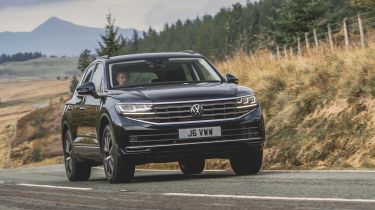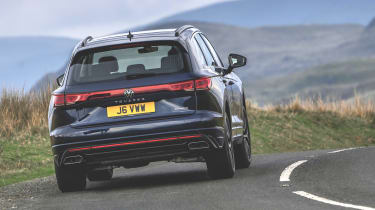Volkswagen Touareg SUV - Engines, drive & performance
The Volkswagen Touareg is filled with chassis technology, but it feels rather numb
The Touareg is based on the same underpinnings as the Porsche Cayenne and Bentley Bentayga, but this is a more sensible animal that puts comfort ahead of cornering g-forces. We can understand why – previous versions of the Touareg have hardly been enthusiasts' favourites after all – but it’s a shame a bit more of the Porsche's appetite for spirited driving couldn’t have filtered through. Instead, the steering feels rather lifeless, even if you select a driving mode that makes it heavier.
What the Touareg can't offer when it comes to driving exhilaration, it makes up for with its incredibly relaxing and comfortable demeanour on the road. There's a fair amount of road noise from the huge tyres fitted across the range, but little wind noise to complain about.
Basic Touaregs (currently Elegance-trimmed cars) come with a normal steel-sprung chassis, while posher ones (currently Black Edition and R) have air suspension that allows you to vary the ride height and ride stiffness. The former can also be upgraded for the latter optionally. Whichever you go for, we’d advise picking a car with the smallest wheels possible, because this has a huge effect on the ride comfort. An Elegance on the smallest 20-inch wheels and steel springs is a lovely thing indeed, and keeps you comfortable and cosseted. It’ll actually be more comfortable than a car with air suspension and 21-inch wheels, despite the more sophisticated suspension arrangement, such is the effect of wheel size on the Touareg – the ride gets more and more knobbly the bigger its wheels get.
More reviews
If you’re prepared to pay extra, you can also add the optional active all-wheel steering, which turns the rear wheels a few degrees in the opposite direction to the front tyres in low-speed corners. You might not be able to see it working, but from behind the wheel it gives the Touareg a similar turning circle to a Volkswagen Golf, which helps in town centres or busy car parks. It’s an absolute godsend and makes the massive Touareg feel like a much smaller car to manoeuvre, so we think it’s worth adding as an option as it’s not terribly much more expensive.
Volkswagen Touareg diesel engines
Six-cylinder engines are renowned for their smooth running and VW's 3.0-litre V6 is no exception. It’s quiet and feels powerful enough if you need to pick up the pace. That’s especially the case in the 282bhp version (which does 0-62mph in 6.4 seconds), but the entry-level 228bhp engine is no slouch either. An automatic gearbox is fitted as standard, and it suits the nature of a large SUV, allowing you to waft along in Comfort mode, or speed up its response in Sport.
The eight-speed automatic gearbox can be a little slow to respond, though, and seems a little too keen to kick down a gear rather than make good use of the engine's plentiful pulling power.
Petrol engines
While the majority of UK buyers tend to pick the diesel, the 3.0-litre TSI petrol shouldn't be overlooked. It's slightly faster for a start, with 335bhp getting it from 0-62mph in a sporting 6.1 seconds – faster than several hot hatchbacks – and on to a possible top speed of 155mph. If you don't plan on big miles or simply don’t want a diesel, the petrol
Plug-in hybrids
At one time, the only plug-in hybrid Touareg was the performance-focused R model. It uses the 3.0-litre V6 petrol as a base, along with electric motors that add extra power for a total of 456bhp. Zero-to-62mph is dealt with in 5.1 seconds but the R treatment is at odds with the Touareg’s comfortable and hushed character, and all in all, the Touareg R can’t hold a candle to the fastest SUVs on sale. The additional weight of the hybrid powertrain means the R never feels agile or sporty. It doesn’t ride very well either; it sometimes gets caught out by uneven surfaces and large potholes. A BMW X5 xDrive45e or Porsche Cayenne E-Hybrid are much more convincing as sporty SUVs.
Later on, VW introduced a more economy-focused version of the PHEV Touareg. This has a vastly toned-down 375bhp version of the R’s powertrain. It’ll still crack the 0-62mph dash in less than six seconds, but ekes out a few more mpg according to official figures. It’s still hardly the kind of eco-warrior-wagon that Greta Thunberg would be happy to roll around in.









